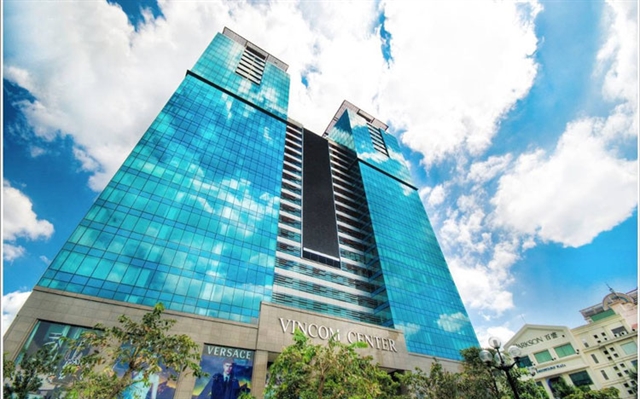 Economy
Economy

 |
| An office building in HCM City. Businesses that recognise their part in mitigating climate change can better recruit and retain employees. — Photo from Internet |
HCM CITY — Businesses that recognise their part in mitigating climate change can better recruit and retain employees, and better serve customers and shareholders, experts said.
In a new report about office stock across Asia Pacific, Trang Bùi, country head of Cushman & Wakefield Vietnam, confirmed that public space would be severely lacking or completely lost if developers are only interested in making buildings, without paying attention to creating green living space between buildings and other facilities.
“In recent years, Việt Nam's major cities have made significant progress in urbanisation, but the tight construction density of high-rise office, retail and apartment building projects are crammed on an increasingly narrow land area.
This phenomenon also increases the density of the population concentrated in one area, leading to an overload on infrastructure and a very low ratio of green areas per capita,” she said.
According to the Department of Technical Infrastructure under the Ministry of Construction, the ratio of green trees per person in urban areas of Việt Nam is low, only 2-3 sq.m per person, while the minimum green target of the United Nations is 10 sqm and the norm of modern cities in the world is between 20-25 sqm per person.
The Cushman & Wakefield report has a wider view about office stock in Asia Pacific.
The report said that office stock in Asia Pacific faces a lower risk of obsolescence than that in Europe or North America, but the ongoing flight to quality and growing focus on sustainable buildings could shorten the timeline available for investors and landlords to optimise their assets.
Approximately half of the region’s existing office stock is secondary grade while only 43 per cent of the prime-grade stock has any form of sustainability accreditation. This means that approximately 28 per cent of existing stock meets specifications for top corporate tenants; the remaining 72 per cent will require some form of optimisation to remain relevant.
The Asia Pacific report called “Rethinking the office sector: Optimising your asset for a new era” considers factors including the average age of prime office assets, the percentage of prime stock to total stock within a market, return-to-office rates, sustainability accreditation and employee density benchmarks when weighing up the risk of obsolescence for 10 key markets across Asia Pacific.
It also shows tailwinds for the Asia Pacific market are likely to lessen the risk of obsolescence seen in other regions.
“Asia Pacific’s growth drivers include the creation of almost 15 million new office jobs by 2030, a higher return-to-office rate than other parts of the world, potential de-densification of workspaces and younger office business districts. These factors will provide a buffer against some of the more severe headwinds felt in other regions,” said Dr. Dominic Brown, head of International Research Asia Pacific and the report's author.
“The risk of office obsolescence, or at least the need to reposition assets, is rising across the world. Asia Pacific is currently benefiting from stronger office job creation and GDP forecasts than other regions, but all indicators show a clear and growing occupier preference for higher quality, better amenity stock,” said James Young, head of Investor Services for Asia Pacific and Europe James Young.
“This occupier flight-to-quality has resulted in the top grade of office stock accounting for more than half of the total office demand in Europe every year since 2019; a similar trend is expected to continue driving competition among occupiers for the approximately 30 per cent of sustainability certified, premium office space in Asia Pacific.
Investors who reposition their assets stand to benefit from this growing demand for sustainable, prime-grade stock; those who do not will face diminishing returns.” — VNS




